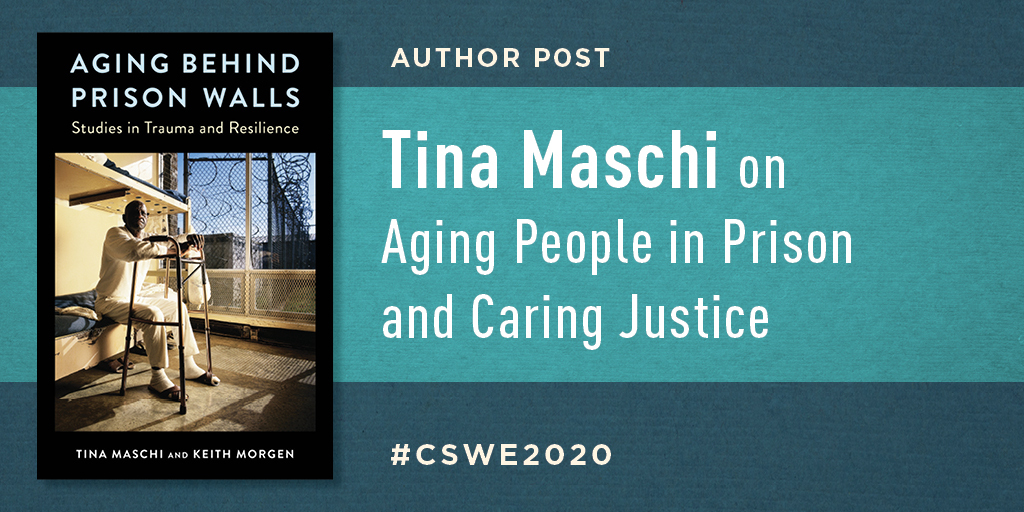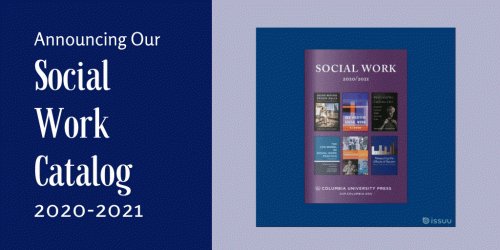Aging People in Prison and Caring Justice
By Tina Maschi

“Aging Behind Prison Walls fills a gap in the research literature by providing both quantitative and qualitative data not available elsewhere. Enriched by extensive data and compelling personal narratives, it offers a portrait of prison life that is comprehensive and fascinating.”
~Katherine van Wormer, coauthor of Women and the Criminal Justice System
More than 200,000 men and women over the age of fifty languish in prisons around the United States. It is projected that by 2030, one-third of all incarcerated individuals will be older adults. In this CSWE virtual exhibit post, Tina Maschi introduces us to her new book Aging Behind Prison Walls: Studies in Trauma and Resilience, which she coauthored with Keith Morgen.
• • • • • •
Today, we are more and more aware of a crisis that was once almost invisible: the rapidly growing numbers of older, sick, and dying people who are locked in America’s prisons. This is particularly concerning given the current COVID-19 pandemic and its pernicious impact on the prison system. Prisons were not designed to deliver acute and specialized long-term care, nor do they have the staff and resources for it.
Older generations suffer cumulative disadvantages such as untreated health and mental health issues, social isolation, oppression (e.g., ageism, sexism, racism), toxic family stress, lack of access to quality education and community services, discrimination, and structural institutional policy barriers, especially for minority groups. These cumulative disadvantages are significantly aggravated by the trauma of prolonged incarceration.
“Our collective decision-making around matters of care and justice has created what scholars call a ‘silver tsunami.’”
In our forthcoming book, Aging Behind Prison Walls, Keith Morgen and I examine this phenomenon of older adults in prison alongside their portraits and stories. Throughout the book, we unearth the current situation using data and insights from over three decades of work with individuals of all ages involved in the criminal justice system. Our collective decision-making around matters of care and justice has created what scholars call a “silver tsunami.”
Through the news and social media, we can witness what is happening behind prison fences. The question is, have we individually and collectively taken the time to reflect on how we have reached this critical juncture of the coronavirus, social unrest, and the mass aging and dying of people from diverse backgrounds in the United States and abroad? In our study of these populations, we discovered how these populations make opportunities out of crisis. In my thirty years of experience working and learning with these elders, I have seen that many find their own pathways that they share with others to help them transform their lives.
The stories and data about incarcerated older adults in my book are not only about vulnerability and victimhood. They are also about strength, resilience, self-empowerment, wisdom, and personal growth. The personal stories of these inmates describe how they are surviving—and even thriving!—despite the stress of physical confinement. Many formerly incarcerated people from younger generations credit the mentoring they received from older adults while in prison. Inmate hospice volunteers have reported on the therapeutic and curative effects of caring for older or dying persons in prison. They note how such experiences taught them compassion for others in a way that traditional punishment and rehabilitation programs never did. It was the aging “prisoner” who awakened them—and now us—to the possibility of a form of justice that cares.
“A caring justice perspective replaces punishment with mercy, compassion, unconditional love, transparency, and accountability.”
Albert Einstein once said, “We cannot solve our problems with the same level of thinking that created them.” This is the heart of Aging Behind Prison Walls. We must move away from fear-based, problem-focused thinking to creative, resilient, and solution-focused thinking to make this mental and emotional shift, both on the individual and the collective level. We must usher in a new age of caring justice to replace the previous age of criminal justice.
The term caring justice refers to a new consciousness around how we value, treat, and care for each other, especially older adults, marginalized groups, and those who have been caught up in the criminal justice system. The caring justice perspective transcends pure dualistic thinking, opting instead for a relational or collectivist approach in which individuals and communities are responsible and accountable for health and public safety matters.
“Ushering in a caring justice consciousness can guide criminal justice reform and help us prevent human-made public safety disasters, such as our contemporary prison system.”
This new age of caring justice has the promise of freeing us to consider alternative approaches to incarceration. The American system overemphasizes relentless retribution and cruel punishment. A caring justice perspective replaces punishment with mercy, compassion, unconditional love, transparency, and accountability. Ushering in a caring justice consciousness can guide criminal justice reform and help us prevent human-made public safety disasters, such as our contemporary prison system. It can also help us take action so that we can provide emergency assistance to older, sick, and dying people in prison as well as their family members and communities.
The COVID-19 pandemic has brought forth a brave new world, one full of new challenges. But it is also an opportunity to reclaim personal and universal love. We are all interconnected—what happens to one of us happens to all of us. In our research, we observed how older adults in prison practice detached observation of the lower emotions and behaviors; they can ignore fear, shame, hatred, and violence and choose to unconditionally love. While we all sit through coronavirus lockdowns, older adults in prison often use time alone as an opportunity to reflect. Rather than perceiving this as social isolation, something to fear, they use it as a chance to tap into their inner resources, strengths, and wisdom, which they then freely share with others.
Recovery and transformation is a multidimensional process. But it can start with simple choices, such as loving and forgiving yourself and those around you. By releasing ourselves, we will release them.
Save 20% on all CSWE featured titles when you use discount code CSWE2020 at checkout now through December 31.







